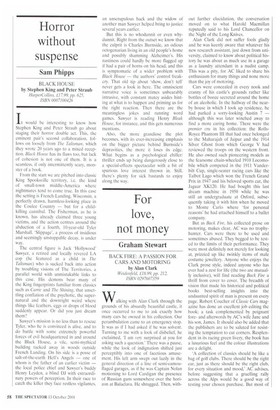Horror without suspense
Sam Phipps
BLACK HOUSE by Stephen King and Peter Straub HarperCollins, £17.99, pp. 625, ISBN 0007100426 It would be interesting to know how Stephen King and Peter Straub go about staging their horror double act. This, the eminent pair's second collaboration, follows on loosely from The Talisman, which they wrote 20 years ago to a mixed reception. Black House has its flaws too, but lack of cohesion is not one of them. It is a seamless, if only intermittently scary, monster of a book.
From the start we are pitched into classic King Spooksville territory, i.e. the kind of small-town middle-America where nightmares tend to come true. In this case the setting is French Landing, Wisconsin, a perfectly drawn, harmless-looking place in the Coulee Country — but for a childkilling cannibal. The Fisherman, as he is known, has already claimed three young victims, and the action centres around the abduction of a fourth, 10-year-old Tyler Marshall. 'Slippage', a process of insidious and seemingly unstoppable decay, is under way.
The central figure is Jack 'Hollywood' Sawyer, a retired and locally revered LA cop (he featured as a child in The Talisman) who is sucked back into action by troubling visions of The Territories, a parallel world with unmistakable links to this case. His demons bear many of the King fingerprints familiar from classics such as Carrie and The Shining, that unsettling conflation of the psychotic, the supernatural and the downright weird where things like feathers, eggs or drops of blood suddenly appear. Or did you just dream them?
Sawyer's mission is no less than to rescue Tyler, who he is convinced is alive, and to do battle with some extremely powerful forces of evil headquartered in and around the Black House, a vile, semi-mythical building tucked away in woods outside French Landing. On his side is a posse of salt-of-the-earth Hell's Angels — one of whom is the father of an earlier victim — the local police chief and Sawyer's buddy Henry Leyden, a blind DJ with extraordinary powers of perception. In their race to catch the killer they face restless vigilantes,
an unscrupulous hack and the widow of another man Sawyer helped bring to justice several years earlier.
But this is no whodunnit or even whydunnit. Right from the outset we know that the culprit is Charles Burnside, an odious octogenarian living in an old people's home and possibly shamming Alzheimer's. His nastiness could hardly be more flagged up if had a pair of horns on his head, and this is symptomatic of a wider problem with Black House — the authors' control freakcry. That old tip about 'show, don't tell' never gets a look in here. The omniscient narrative voice is sometimes unbearably intrusive, with constant matey asides hinting at what is to happen and priming us for the right reaction. Then there are the meaningless jokes and running word games. Sawyer is reading Henry Bleak House, for instance, and this gets numerous mentions.
Also, the more grandiose the plot becomes, with its ever-increasing emphasis on the bigger picture behind Burnside's depravities, the more it loses its edge. What begins as a psychological chiller/ thriller ends up being dangerously close to a special-effects spectacular with a bit of spurious love interest thrown in. Still, there's plenty for sick bastards to enjoy along the way.


























































































 Previous page
Previous page